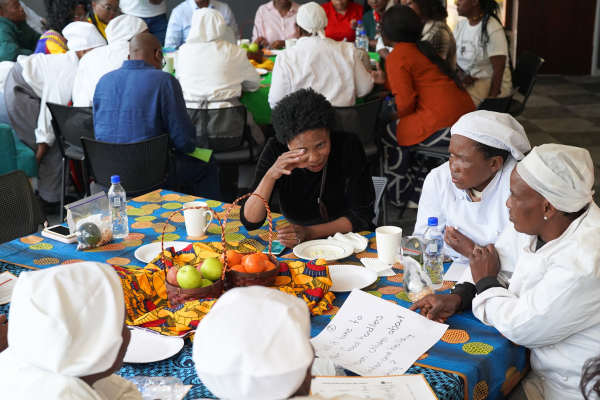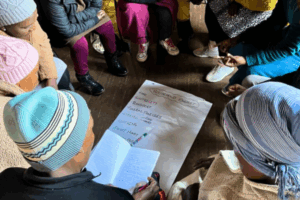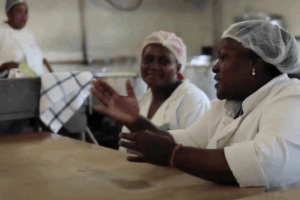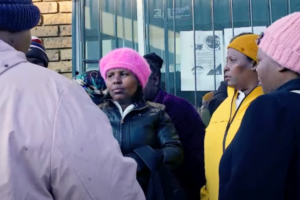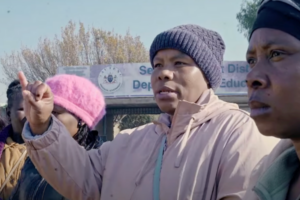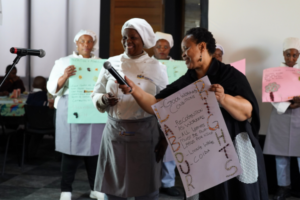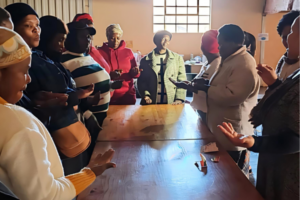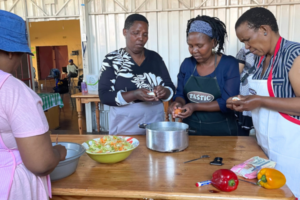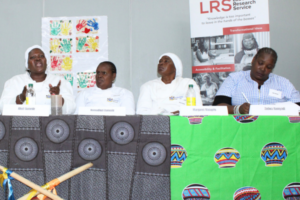LRS Colloquium – Food in School is a Social Justice Issue: Volunteer Food Handlers led discussions with a diverse range of stakeholders on strengthening the NSNP and promoting decent work for care workers. Johannesburg | September 2024
Volunteer Food Handlers struggle to access UIF benefits at the end of their two-year contracts working under the National School Nutrition Programme (NSNP). Despite contributing to the Unemployment Insurance Fund, they face delays, misinformation, and a lack of support. The NSNP, implemented by the Department of Basic Education, is among the social sector programmes of the Expanded Public Works Programme that rely on women’s labour.
This article is the third in a series on our campaign with a group of former and current Volunteer Food Handlers in Gauteng for adequate access to UIF benefits. Read the articles here (UIF framework), here (UIF claiming process), here (role play as a feminist popular education tool in UIF campaign by food handlers), and here (a day in the life of a food handler).
It has long been a moral, ethical—and indeed legal and philosophical—question: What is dignity? Who deserves it? Why is it important?
Fortunately, for the people of South Africa, the question of dignity is not merely rhetorical. It is a constitutional imperative. Section 10 of the Constitution affirms unequivocally: “Everyone has inherent dignity and the right to have their dignity respected and protected.”
And yet, for the food handlers who worked tirelessly in our school kitchens—feeding children, maintaining hygienic environments, and ensuring that the school ecosystem could function—this right to dignity has come under assault.
The process of claiming from the Unemployment Insurance Fund (UIF) has been nothing short of traumatic for these workers. Many have encountered rejection, bureaucratic runarounds, and a seemingly endless stream of administrative stumbling blocks. For women already grappling with financial insecurity after the end of their two-year contracts, these hurdles are not just inconvenient—they are devastating.
When they were working, many food handlers report being treated with a semblance of respect, due to the visible importance of their role: ensuring that children were fed and able to concentrate in class. They upheld the dignity of the school—and by extension, the Department of Education—through their care, labour, and consistency. But now, with their contracts ended, they feel discarded. Their labour, once seen as essential, is rendered invisible. Their dignity, once faintly acknowledged, now outright denied.
To deny dignity to any person is to suggest that their humanity is lesser, their worth inferior. In this context, the erasure of the food handlers’ dignity is not only a personal injury—it is a political disgrace. It undermines the very democratic values that South Africa claims to uphold. It is a betrayal of the constitutional promise of equality and fairness. And it dishonours the struggles of the many freedom fighters who envisioned a society in which the most vulnerable are protected, not forgotten.
Dignity is not abstract. Its violation has material consequences. It is deeply traumatic to be unseen and unheard by the very systems meant to serve and protect. It eats away at the ability to show up for oneself, for one’s children, for one’s community. It deprives people not just of benefits, but of belief.
The food handlers, like many women in the care work sector, navigate working environments that mirror the conditions of domestic labour: cooking, cleaning, emotional care, physical strain, and the psychological toll of being constantly undervalued. In these roles, they are vulnerable to both subtle and overt forms of abuse—forms that are normalised, overlooked, or dismissed outright.
This mistreatment did not begin with the UIF process. It is cumulative. It includes their exclusion from school staff functions. It includes the casual accusations of theft without proper investigation. It includes being denied basic tools and cleaning equipment, and having to purchase or bring their own. It includes being overworked and—crucially—not being credited for the full hours they worked, which directly impacts the UIF they are eligible to receive.
These indignities are not isolated incidents. They are systemic patterns that speak to how society views poor Black women: as disposable, voiceless, unworthy of care or compensation.
And yet, in the face of this injustice, the food handlers have not surrendered. Through their monthly gatherings, they continue to hold space for each other—spaces marked by radical care, compassion, and mutual respect. In these rooms, they are not invisible. They are seen. They are heard. They are believed.
These moments of community have given them the strength to continue fighting—not only for their UIF claims, but for the broader recognition of their dignity and rights as workers and women.
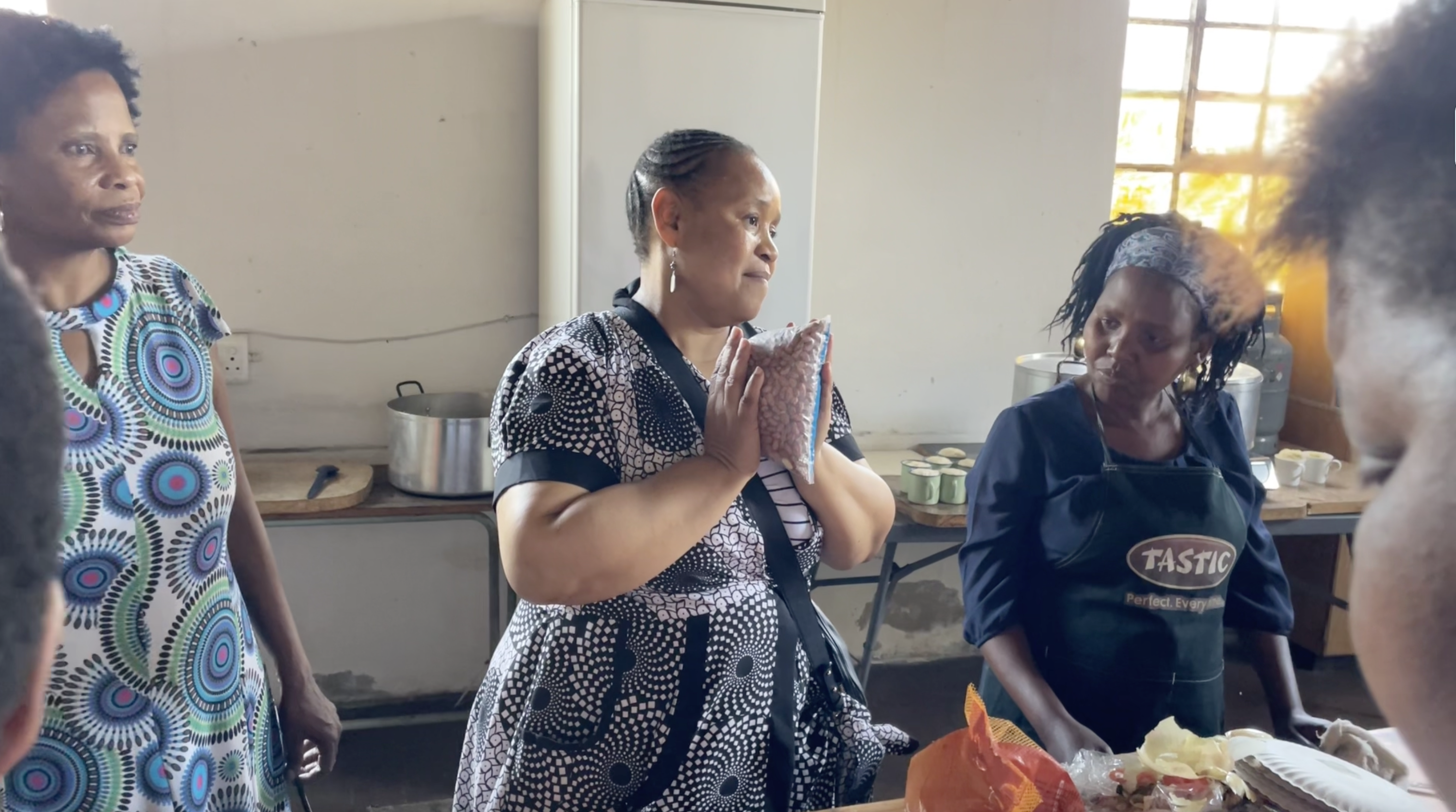
Decolonising nutrition: Volunteer Food handlers’ monthly meeting | Gauteng, 2024
“Power Up! helped me learn to value, recognise, and respect myself. When I love and value myself, others can see my worth and appreciate the work I do.”
Volunteer Food Handler participant in a monthly meeting on Women's Day - Food handlers explored their identities as women and workers.
The Department of Education and the Department of Labour must take urgent responsibility. The current claiming process is unacceptable—riddled with inefficiencies, hostility, and confusion. It is a cruel irony that those who earned so little in the first place are now made to fight so hard, and spend so much—both financially and emotionally—to access what is legally owed to them.
It is time for both departments to create humane, accessible, and worker-centred mechanisms to support UIF claims. This is not a favour to the food handlers—it is a matter of justice.
To protect the dignity of food handlers is to protect the moral integrity of the nation. South Africa cannot claim to honour human rights while allowing its most essential workers to be discarded once their labour is no longer convenient.
Their dignity is not optional. It is constitutional.
RELATED CONTENT
VIDEO: Access Denied – A Woman Worker’s Struggle for Social Protection
The experience of former Volunteer Food Handler Elizabeth is a powerful reminder of what’s at stake. Her struggle to claim UIF resonates with the experiences of many former Volunteer Food Handlers nationwide.
The UIF advocacy is part of our broader campaign with Volunteer Food Handlers for decent work and valuing of care work in public care work programmes.

